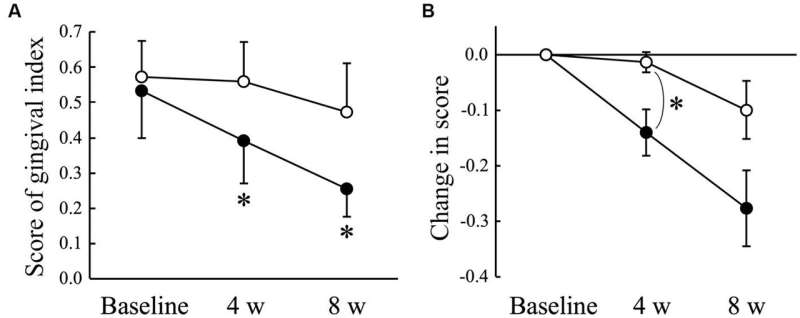November 13, 2023 feature
This article has been reviewed according to Science X's editorial process and policies. Editors have highlighted the following attributes while ensuring the content's credibility:
fact-checked
trusted source
proofread
Doggie dental health: Aged garlic extract shows promise as gum disease treatment

Among dogs, periodontal (gum) disease affects various breeds at rates between 44% and 100%, with higher susceptibility in smaller breeds and older dogs. Veterinarians normally advise dog owners to brush their dogs' teeth on a daily basis to remove the dental plaque and oral debris whose buildup can lead to gum disease; however, compliance can be difficult, often due to issues of willingness and temperament.
In a new study, a research team from Japan, seeking a better means of prevention and treatment, has found that a compound of aged garlic extract (AGE) administered orally yielded improvement without adverse effects in beagles with mild gingivitis. The work is published in Frontiers in Veterinary Science.
Canine gingivitis, the early stage of gum disease in dogs, is marked by redness of the gums and reversible inflammation. In many cases, untreated gingivitis leads to periodontitis, which can cause recessed gums as well as loss of bone, connective tissue, and teeth. In dogs, as in humans, this later stage of gum disease is also linked to serious overall health issues, which in dogs can include cardiovascular and kidney disease, and cognitive decline, among others.
It is commonly known that dogs should not eat raw or cooked garlic or onions, which are members of the Allium genus that can be toxic to their systems by causing hemolytic anemia. However, humans have used garlic (Allium sativum) for thousands of years as food and as a treatment for numerous health problems, including asthma as well as cardiovascular and gastrointestinal issues.
Moreover, multiple studies involving humans have reported on the anti-inflammatory and anti-cancer properties of aged garlic extract, as well as its therapeutic effects in cases of atherosclerosis, hypertension, metabolic syndrome, and periodontitis in mild to moderate stages.
Seeking to build on earlier work showing that aged garlic extract—consisting of fresh garlic extracted over a lengthy period of time and allowed to become less irritative and odorless—did not produce adverse reactions in dogs, the researchers of this new study sought to investigate whether it might also provide them a therapeutic benefit.
The team prepared an aged garlic extract powder by soaking slices of fresh garlic cloves in an ethanol and water mixture for 10 months and then drying it with a circulation dryer. Ten beagles with mild gingivitis but otherwise good general health (four males and six females ranging from 2 to 9 years old) formed the study population and were assigned to either the test or placebo group, each of which included two males and three females.
At baseline and again at four and eight weeks after treatment, the researchers measured the dogs' gingival indices at 22 oral cavity sites; the average gingival index was less than 1. They also measured the volatile sulfur compounds (VSCs) in the dogs' exhaled breath at baseline and at eight weeks after treatment. Feeding the dogs normally and providing water freely during the test period, they mixed either a low dose of the test powder (18 mg/kg/day) or the placebo powder into the dogs' food once a day for eight weeks, confirming each time that the dogs finished the food completely.
Among the notable results, the gingival index scores among the test group subjects showed significant decreases at four and eight weeks, though among the placebo group they did not. VSCs measured with a halimeter were measurably higher in the placebo group at eight weeks, but showed no significant change in the test group.
Considering these findings along with their additional measurements of thiol levels, periodontal pathogenic enzyme activity, and concentrations of salivary IgA and CAMP, the researchers believe that aged garlic extract provides a therapeutic benefit in cases of canine gingivitis and halitosis, and that their results may support its use as a dietary supplement as both a prevention and a treatment for these conditions.
However, they caution that this was a small-scale study on a single dog breed with mild gingivitis. Nevertheless, it points the way forward.
"Therefore," the paper states, "large-scale studies are needed to investigate the therapeutic effects of AGE on periodontal disease across a wide range of breeds and body sizes. Second, this study examined the effect of AGE only on mild gingivitis with gingival index of less than 1; thus, further studies are needed on dogs with more severe gingivitis and periodontitis."
More information: Kaori Takahashi et al, Therapeutic effect of aged garlic extract on gingivitis in dogs, Frontiers in Veterinary Science (2023). DOI: 10.3389/fvets.2023.1277272
© 2023 Science X Network



















